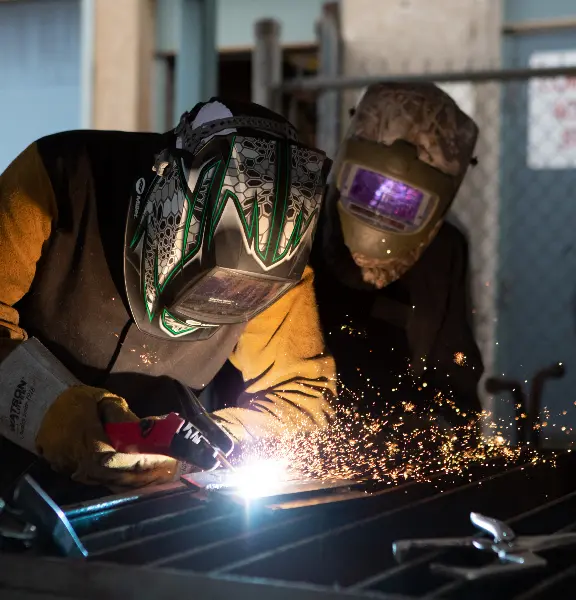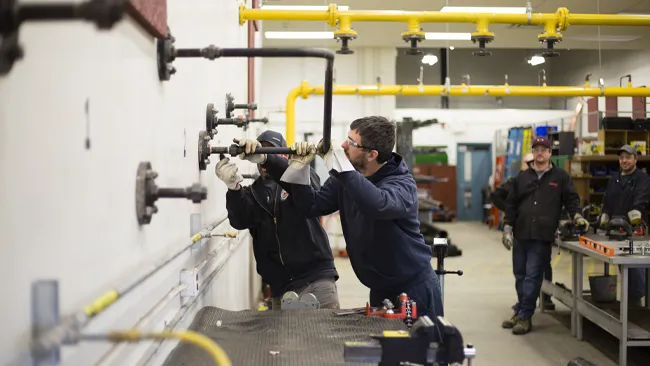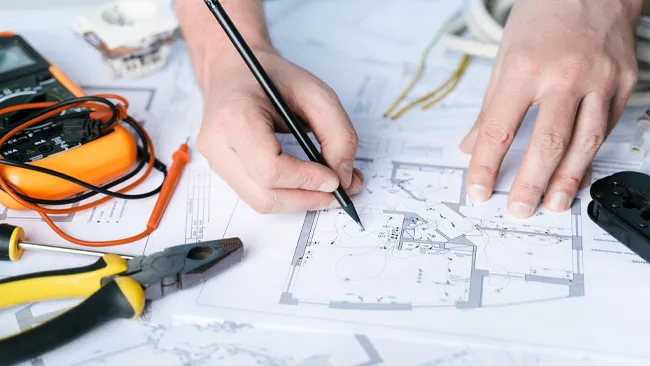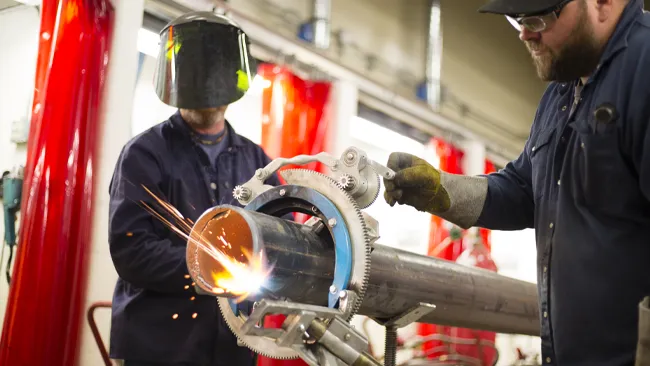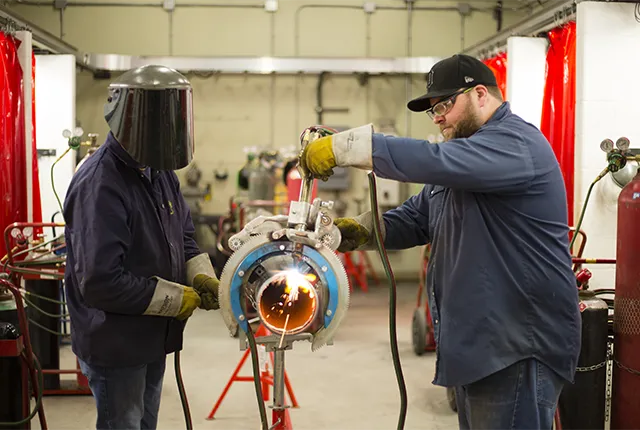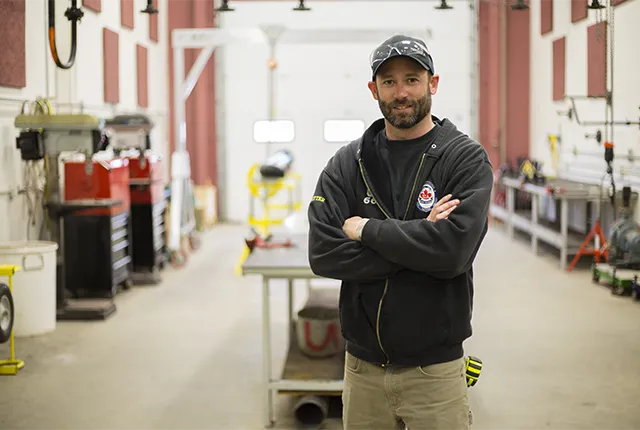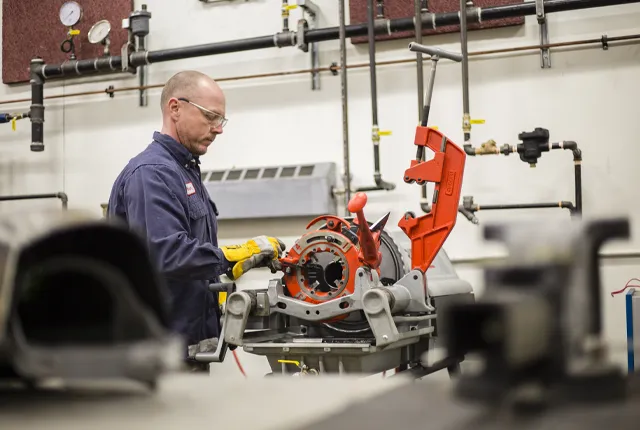Steamfitters lay out, assemble, fabricate, maintain, troubleshoot and repair piping systems carrying water, steam, chemicals and fuel in heating, cooling, lubricating and other process piping systems. Steamfitters are employed in factories, plants, and similar establishments, and also by pipefitting contractors or they may be self-employed.
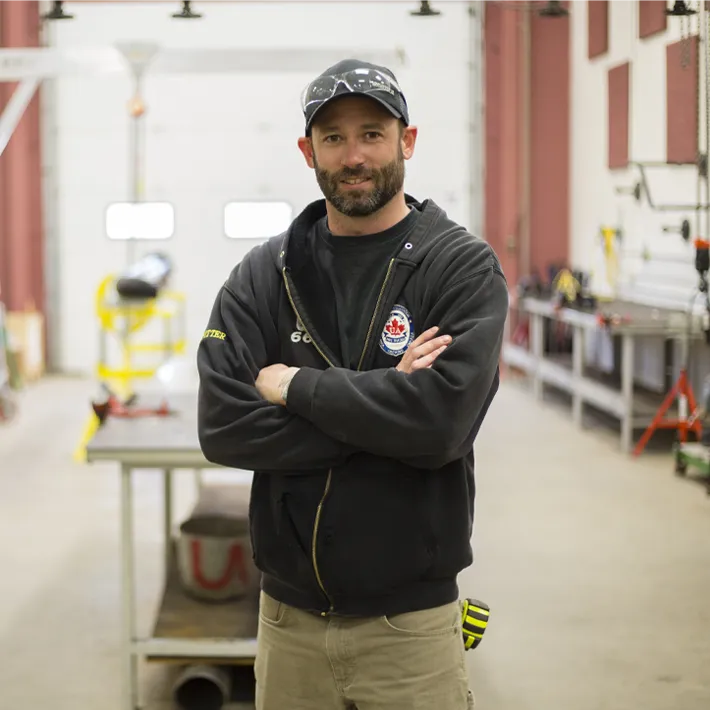
Training
The Steamfitter apprenticeship program consists of on-the-job and in-school training. The program typically takes five years to complete and consists of:
- 8,280 hours of on-the-job training and work experience
- 720 hours of in-school training
Red Seal Exam
At the completion of the in-school portion of the apprenticeship, graduates are given a week of preparation before they write the Red Seal exam for the trade.
Our students may write this exam at the College at the end of the training, or book a separate time to write the exam at the MLTSD office.
What do Steamfitters do?
Admission Requirements
To be eligible for this program, applicants must:
- Have a sponsor or employer and must be registered through the Ministry of Labour, Training & Skills Development
- Have a minimum Grade 12 high school education or equivalent
- Be at least 16 years of age
Application Process
This is an apprenticeship program and follows a different application process than regular post-secondary education programs. You cannot apply to this program through ontariocolleges.ca.
Applicants who are registered as an apprentice in a trade should receive a letter from the Ministry of Labour, Training & Skills Development inviting them to apply for schooling. All applications from that point will need their payment processed by the Office of the Registrar & Financial Aid Services at Lambton College.
If you are a registered apprentice and have not received a letter regarding apprenticeship school, please contact your local Ministry of Labour, Training & Skills Development office.
Training Dates
The following training dates are for the 2023-2024 academic year for the Steamfitter apprenticeship.
- Basic (STMB) Dates
- October 28, 2024 - December 20, 2024
- Intermediate (STMI) Dates
- March 10, 2025 - May 2, 2025
- Advanced (STMA) Dates
- August 26, 2024 - October 25, 2024
- January 6, 2025 - March 7, 2025
Course List
Steamfitting Systems I
This course introduces a broad spectrum of areas to the apprentice. All facts and principles of hydronic heating systems, gravity hot water systems and forced-circulation hot water systems. Other topics include hot water system designs, hot water boilers, accessories and valves.
Piping Materials & Joining Techniques
This course provides the apprentice with the theory and the hands - on practical applications of pipe installations. The apprentice will be able to start applying practical applications to the theory they are learning. Instruction will be given on installing and joining pipe and tubing in accordance with government safety regulations, manufacturer's recommendations and accepted industry standards.
Trade Documentation I
This course provides the apprentice with basic Drafting skills which will be required in the Steamfitter trade.
Applied Trade Calculations I
This course provides the apprentice with basic skills in a wide range of mathematical and measurement areas which will be required in the steamfitter trade and to prepare the apprentice for more advanced levels.
Welding I
This course introduces the apprentice to safe operation and basic principles and applications of oxyacetylene cutting and welding.
Workplace, Safety, Rigging & Hoisting I
This course provides the apprentice with the ability to interpret and understand Occupational Health and Safety Codes, Acts and Regulations. Also, this course introduces the apprentice to Safe Rigging and Hoisting Procedures.
Steamfitting Systems II
This course introduces a broad spectrum of areas to the apprentice. General Principles in pipe fabrication, process piping and steam properties. Other areas that are covered include: steam boilers and accessories, high and low pressure steam plants, and value zoning.
Pipe Fabrication II
Through this course the apprentice will gain the ability to use templates and pipe fabrication techniques in accordance with industry standards, to apply trade calculations involving tube bending operations in accordance with manufacturer's recommendations and accepted industry standards, to correctly install a steam boiler heating system.
Trade Documentation
Through this course the apprentice will gain the ability to illustrate template development and use of drawings and blueprints. The apprentice will also gain the ability to prepare applied business practice documents.
Applied Trade Calculations II
Through this course the apprentice will gain the ability to solve problems involving cube and cube root, angles and degrees, volumes of tanks and cylinders to piping system practicals, trade related problems involving gas laws, simple and compound interest, and trade related problems involving list price and trade discounts, with the aid of a calculator.
Welding II
This course introduces the apprentice to the safe operation and basic principles and applications of Shielded Metal Arc Welding and Oxy-fuel Welding and cutting. The use of shop project fabricated pipe fittings from Pipe Fabrication II reportable subject classes will reinforce the need for well fitted welding joints if available.
Steamfitting Systems III
This course introduces a broad spectrum of areas to the apprentice. General principles in medical gas, sprinkler and standpipes, natural gas systems, refrigeration, air conditioning, heat pumps, high temperature hot water systems.
Fluid Power Systems III
This course introduces a broad spectrum of areas to the apprentice. General principles in pneumatics and hydraulics and compressed air safety are covered.
Trade Documentation III
This course provides the apprentice with advanced drafting skills which will be required in the steamfitter trade.
Welding III
Upon successful completion of this reportable subject, the apprentice is able to describe steamfitting welding processes in accordance with government safety regulations, manufacturers recommendations and specifications and approved Industry standards. Theory will be emphasized to help the apprentice learn the metallurgy, codes, standards, quality control and to work well with a welder-partner on the job.

This Employment Ontario program is funded in part by the Government of Canada and the Government of Ontario.
Contact Us
Applied Science, Engineering Technology & Trades

